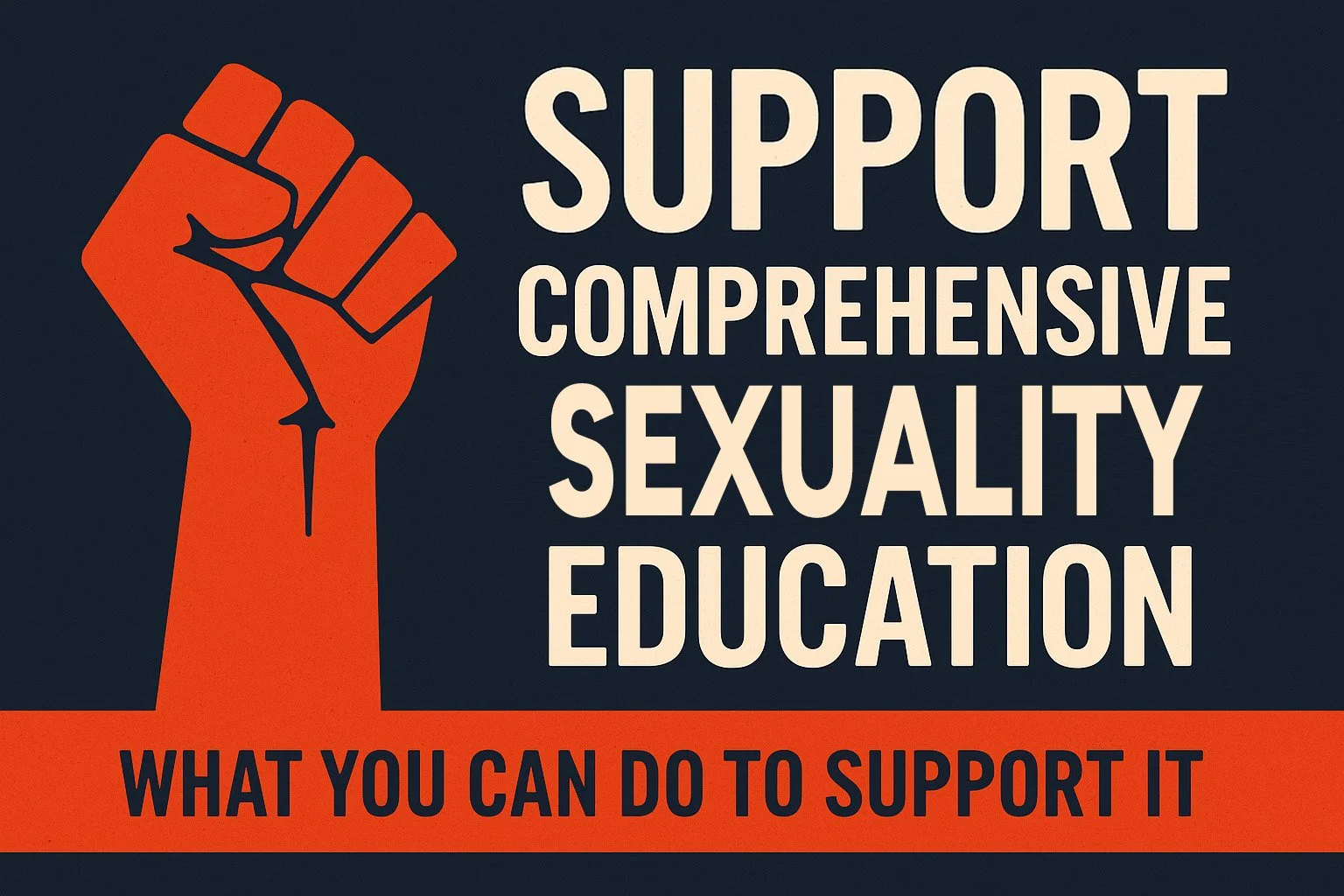Help Protect Comprehensive Sexuality Education
Comprehensive sex education (CSE) is under growing attack, often from the same groups pushing to ban books, silence LGBTQ+ voices, and restrict inclusive learning. This movement seeks to limit young people’s access to medically accurate, age-appropriate information about their bodies, relationships, and rights.
But research is clear: when done well, comprehensive sex education reduces rates of teen pregnancy and sexually transmitted infections, improves consent and communication skills, and supports youth in building healthier relationships across their lives.
🔗 Read the CDC’s findings on the effectiveness of CSE
🔗 A 2023 Guttmacher Institute review outlines why abstinence-only programs fall short.
Here are concrete steps you can take to support and protect comprehensive sex education in your community:
1. Advocacy and Community Engagement
📌 Organize Community Support
Join or form a statewide or local coalition to advocate for CSE. Groups like SIECUS and Advocates for Youth offer toolkits for organizing town halls, engaging with policymakers, and mobilizing youth.
Example: In 2022, Colorado’s “Healthy Youth Act” was protected thanks to a broad coalition of parents, teachers, and students organizing letter-writing campaigns and testimonies at legislative hearings.
📌 Public Education
Host community education sessions and share accurate, science-backed resources. Sex Ed for Social Change (SIECUS) provides fact sheets, curriculum breakdowns, and myth-busting guides.
📌 Engage in School Board Elections
Groups like Run for Something and Vote Mama are helping progressive candidates win local school board seats where sex education policies are decided.
Example: In 2023, Wisconsin parents organized a successful campaign to elect pro-CSE board members after the district tried to restrict curriculum content.
📌 Partner with Stakeholders
Reach out to pediatricians, social workers, and youth advocates. The American Academy of Pediatrics actively supports CSE and has downloadable policy statements to share with decision-makers.
📌 Engage Parents and Caregivers
Develop opt-in programs where families can preview materials and meet instructors. Planned Parenthood’s Parent Resources offer conversation guides and activities that build trust and transparency.
2. Ensuring Quality and Accuracy
📌 Choose Appropriate Curricula
Look for programs endorsed by Sex Ed Collaborative, which evaluates materials for inclusivity, cultural responsiveness, and trauma-informed approaches. Good examples include:
FLASH – evidence-based and adaptable
Rights, Respect, Responsibility – inclusive and free
📌 Train Educators
Support professional development and certification programs like those from Cardea Services. Educators often cite lack of training as a top barrier to delivering CSE confidently and accurately.
📌 Address Diverse Needs
Use curricula that are LGBTQ+ affirming and accessible to youth with disabilities, such as Sexuality and Disability, which offers adaptive tools and lesson plans.
Example: In Oregon, the “My Life, My Choice” program incorporates trauma-informed content for youth impacted by exploitation, including neurodiverse students and youth of color.
📌 Connect to Resources
Ensure schools have clear referral pathways to local health clinics and hotlines. Consider distributing lists from:
Bedsider (birth control access)
Local LGBTQ+ centers and STI testing sites
3. Countering Opposition
📌 Combat Misinformation
Opponents often spread myths (e.g., “CSE encourages sexual activity”). Use platforms like FactCheck.org and Media Matters to refute false claims.
Example: When Florida's HB 1069 sought to restrict gender and health education, local coalitions published fact sheets and testified with direct citations from AAP, WHO, and UNESCO.
📌 Address Barriers to Implementation
In rural and underfunded districts, offer community-based alternatives like after-school or youth center programs. Partner with community health educators or nonprofits.
📌 Advocate for Policy Changes
Support legislation like the federal Real Education for Healthy Youth Act, which would fund inclusive, evidence-based programs nationally. Track bills in your state through the National Conference of State Legislatures (NCSL).
📌 Highlight the Benefits
Use local data. For instance:
California saw a 60% drop in teen birth rates after adopting statewide CSE.
Programs that include consent education reduce sexual violence and improve boundary-setting.
4. Legal and Policy Considerations
📌 Support Legal Challenges
If your district mandates abstinence-only education or censors CSE content, connect with organizations like:
📌 Monitor Legislation
Set alerts with BillTrack50 or Planned Parenthood Action to track state laws.
📌 Ensure Accessibility
Use multi-modal formats: large print, screen reader-friendly PDFs, image-based learning tools for youth with intellectual or learning disabilities.
🔗 Sexuality Education for Students with Disabilities (Center for Parent Information and Resources)
Together, We Can Protect CSE
CSE is not about politics—it’s about safety, agency, and health. When we equip young people with the information they need, we invest in a future marked by mutual respect, informed consent, and thriving relationships.
Let’s stand up for education that honors every student’s right to learn, grow, and be safe.

